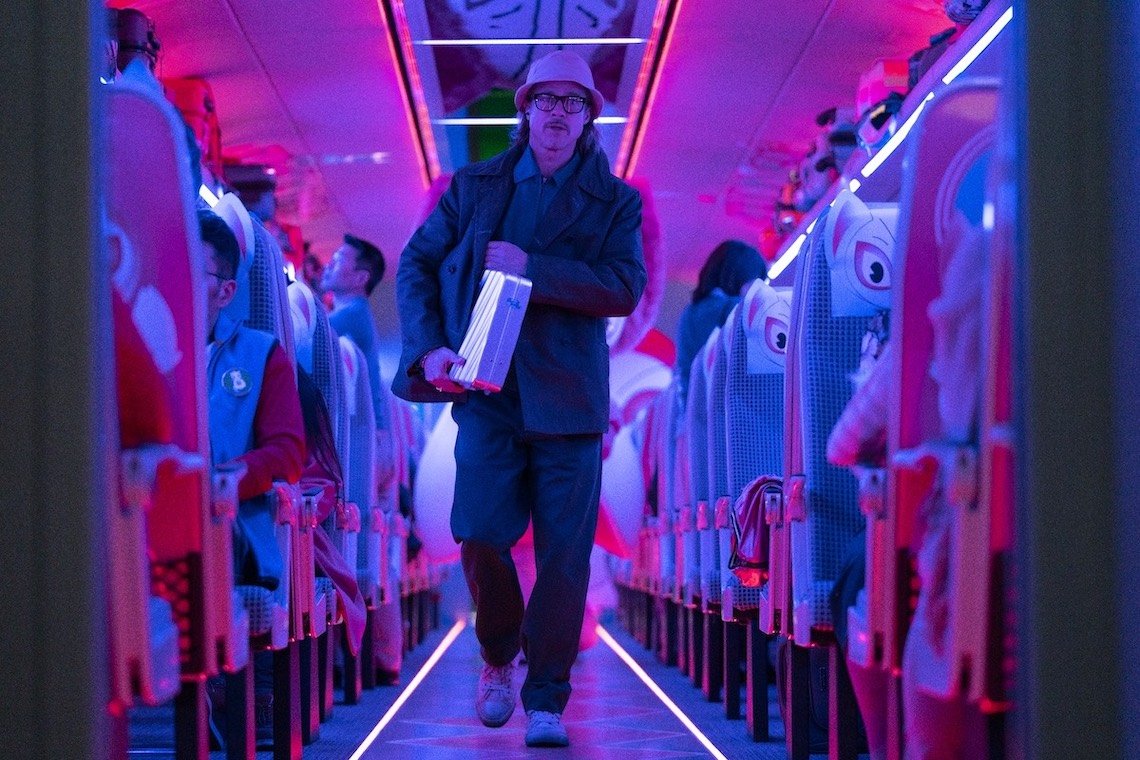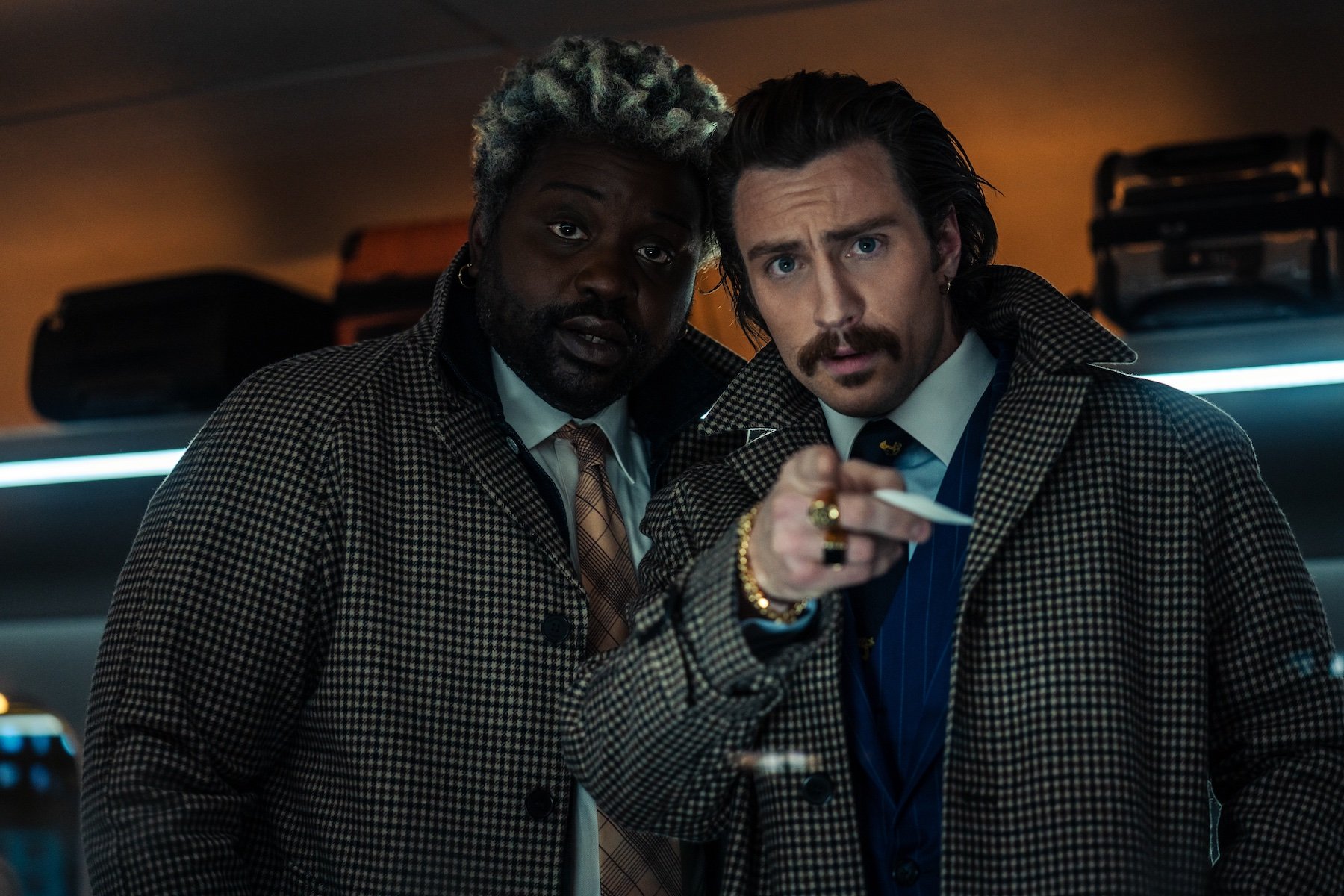Off the Rails
Kick-Ass and Paper Boi steal Star Brad Pitt’s spotlight in ‘John Wick’ mastermind David Leitch’s latest.
Bullet Train
Director: David Leitch • Writer: Zak Olkewicz, based on the novel by Kotaro Isaka
Starring: Brad Pitt, Brian Tyree Henry, Aaron Taylor-Johnson, Joey King, Andrew Koji, Hiroyuki Sanada, Logan Lerman, Michael Shannon, Bad Bunny, Zazie Beetz, Masi Oka, Karen Fukuhara, Sandra Bullock
USA/Japan • 2hrs 6mins
Opens Hong Kong August 4 • IIB
Grade: B
Bullet Train is out of its fuckin’ mind. It really, really, really wants you to like it, and for the first 20 or 30 minutes it comes close to failing miserably. Zak Olkewicz’s (who wrote the “1978” entry in Netflix’s Fear Street) script loads up on exposition and flashbacks, and comes very close to losing its audience while laying the foundation for its increasingly ludicrous railway shenanigans. The character names stamped on the screen come fast and furious, and just as you think you’re going to spend some time with A, director David Leitch moves on to B. It’s exhausting, long before it’s too long.
But then a funny thing happens. Somehow, all those foundations and little details starts to gel and the film starts to, ahem, pick up steam and, ahem, really chug along. That doesn’t make Bullet Train particularly unique, or innovative, or daring. We’ve seen all this before, and like Shakespeare, being done before doesn’t mean it shouldn’t be done again – with a little effort. This is a film cut from the same, evidently enormous cloth as Paul McGuigan’s Lucky Number Slevin, Guy Ritchie’s Snatch (really anything by Ritchie) Joe Carnahan’s Smokin’ Aces, Martin McDonagh’s Seven Psychopaths and every vaguely snarky, narratively twisted, overlapping, star-studded crime thriller to come out down the pipe in the wake of Pulp Fiction. Leitch’s own oeuvre owes much to this tradition: the veteran stunt performer/coordinator was an uncredited guiding hand on John Wick, and officially debuted with Atomic Blonde. It goes without saying there will be some bonkers action.
Right off the top, let’s just dispense with the pissing and moaning about how author Kotaro Isaka’s pulpy thriller has been whitewashed, something Isaka is unfussed about. Granted this is the most non-Japanese people you’ll ever see on a Shinkansen, but hey. Sell your IP to Hollywood and even when we’re all agreeing #RepresentationMatters, sometimes that just goes right out the window. For the most part, Bullet Train works, even without its Japanese-ness. No one’s saying it’s right. It just is.
There is no way to make this long story short. We start with Ladybug (Brad Pitt), an assassin just coming out of therapy and trying to forge a more Zen path, on the phone to his handler, Maria (Sandra Bullock, returning Pitt’s The Lost City favour) and getting instructions for a snatch-and-grab on the bullet train to Kyoto – Kee-yo-to, to the wypipo (©Michael Harriot). He’s supposed to find a briefcase and get off the train at the first station out of Tokyo (that’s a thing on the bullet train?). Naturally, there are more players chasing the case than just Ladybug, among them low level gangster, Kimura (Andrew Koji, Snake Eyes), who’s actually looking for the guy who pushed his son off a roof, Prince (discount Alexis Bledel, Joey King), who’s the picture of innocence (and Japanese schoolgirl-ness), Mexican badass The Wolf (Latin trap singer Bad Bunny), and famed assassins The Twins – Tangerine (Aaron Taylor-Johnson, absolutely rocking a porn ’stache) and Lemon (Brian Tyree Henry), a devotee of the philosophical musings of Thomas the Tank Engine. Just sit back and let the quip-based dialogue wash over you, along with the acrobatic train compartment throwdowns and absurdist violence. Do not ask when the rest of the passengers vanished. Do not ask why the train seems to be a milk run. Do not ask why JR lists the ride from Tokyo to Kyoto as two-and-a-half hours – tops – yet this one appears to leave at night and arrive at sun-up. Huh?
Not asking works also because it lets Leitch exploit his high concept for all it’s worth. Bullet Train works so hard to be effortlessly cool, and “Damn!” gory, and it succeeds most of the time. The problem is you can see it working. It’s like the theatre kid in high school who’s way too keen for their own good. You want to tell them to STFU. It’s very often frantic, outright stupid, derivative and smug, with only a modicum of the stylistic or formal flair Leitch brought to Wick and Blonde – which itself often traded in cliché
And yet. Against any better judgement, Bullet Train is an enjoyable romp, filled with little asides and fleeting moments that are, admittedly, laugh out loud funny. Brad Pitt telling a Becky to, “Eat a bag of dicks, lady,” is hardly the apex of wit, but somehow it’s funny. So is repeatedly punching a squeaky train mascot. And The Elder (Hiroyuki Sanada) trying to impart wisdom to a resistant listener. It should be noted this would be intensely unfunny without a stellar cast (often the case with this sub-genre). Pitt’s trademark easy charm (god I hate admitting he’s charming) is the basis for the connective narrative tissue that propels the story forward, but strategically deployed cameos hit their targets, and every movie should make room for the always glorious Sanada – who can be funny. Who knew? However, Taylor-Johnson and Henry emerge as the MVPs. In the opening segments, their banter (no talking, only banter) presents as forced, but as everything settles down their dynamic becomes the highlight; they make the running gag about them being twins believable. Henry’s proven himself a versatile, engaging actor – slow burn threatening in Widows, goofy in Godzilla vs. Kong, emotionally conflicted on Atlanta – but Taylor-Johnson took a turn for the interesting in 2016 when he co-starred in Tom Ford’s Nocturnal Animals after breaking out in anti-superhero superhero movie Kick-Ass. Without these two Bullet Train would have derailed long before Kee-yo-to. — DEK



